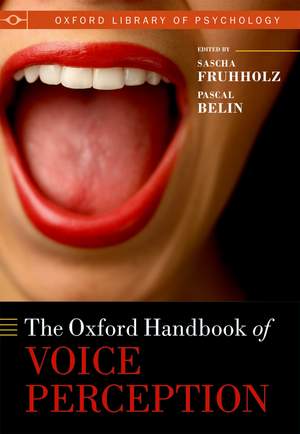Contents
- Part I: The Voice is Special
- 1 Sascha Fruhholz and Pascal Belin: The science of voice perception
- 2 Diana Van and Lancker Sidtis: Ancient of days: The vocal pattern as primordial big bang of communication
- 3 Pascal Belin: The Vocal Brain: Core and extended cerebral networks for voice processing
- 4 Klaus Scherer: Acoustic patterning of emotion vocalizations
- 5 Yuanyuan Wang, Derek M. Houston, and Amanda Seidl: Acoustic properties of infant-directed speech
- 6 Johan Sundberg: The singing voice
- 7 Martin Meyer, Matthias Keller, and Nathalie Giroud: Suprasegmental speech prosody and the human brain: The acoustic and vocal features and the evolutionary architecture of the brain
- 8 Jody Kreiman, Bruce Gerratt: Reconsidering the nature of voice
- Part II: Ontogenetic development of voice perception
- 9 Natacha Paquette, Emmanuelle Dionne-Dostie, Maryse Lassonde and Anne Gallagher: Voice perception in newborns and infants
- 10 Stefan Elmer, Eva Dittinger, and Mireille Besson: One step beyond: musical expertise and word learning
- 11 Evelyne Mercure and Laura Kischkel: Social perception in infancy: An integrative perspective on the development of voice and face perception
- 12 Katherine S. Young, Christine E. Parsons, Alan Stein, Peter Vuust, Michelle G. Craske, and Morten L. Kringelbach: Neural responses to infant vocalisations in adult listeners
- Part III: Evolution and comparative perspective
- 13 Alan K.S. Nielsen and Drew Rendall: Comparative perspectives on communication in human and nonhuman primates: Grounding meaning in broadly conserved processes of voice production, perception, affect and cognition
- 14 Samantha Carouso Peck and Michael H. Goldstein: Linking vocal learning to social reward in the brain: Proposed neural mechanisms of socially guided song learning
- 15 Catherine Perrodin and Christopher I. Petkov: Voice sensitive regions, neurons and multisensory pathways in the primate brain
- 16 Attila Andics and Tamas Farago: Voice perception across species
- 17 Charles T. Snowdon: Emotional and social communication in nonhuman animals
- 18 Josef P. Rauschecker: Dual stream models of auditory vocal communication
- Part IV: Emotional and motivational vocal expression
- 19 Sascha Fruhholz and Leonardo Ceravolo: The neural network underlying the processing of affective vocalizations
- 20 Silke Paulmann and Sonja A. Kotz: The electrophysiology and time-course of processing vocal emotion expressions
- 21 Jocelyne C. Whitehead and Jorge L. Armony: Amygdala processing of vocal emotions
- 22 Kai Alter and Dirk Wildgruber: Laughing out loud! Investigations on different types of laughter
- Part V: Vocal identity, personality, and the social context
- 23 Tyler K. Perrachione: Recognizing speakers across languages
- 24 Stefan R. Schweinberger and Romi Zaske: Perceiving speaker identity from the voice
- 25 Marianne Latinus and Romi Zaske: Perceptual correlates and cerebral representation of voices-identity, gender, and age
- 26 Phil McAleer and Pascal Belin: The perception of personality traits from voices
- 27 Katarzyna Pisanski and David R. Feinberg: Vocal attractiveness
- 28 Sarah Stevenage: Voice processing: Implications for earwitness testimony
- 29 Benjamin Kreifelts and Thomas Ethofer: Voices in the context of human faces and bodies
- 30 Patricia E.G. Bestelmeyer: Linguistic 'first impressions': Accents as cue to person perception
- Part VI: Machine-based generation and decoding of voices
- 31 Kawahara Skuk: Voice morphing
- 32 Alessandro Vinciarelli: Machine-based decoding of voices and human speech
- 33 Maximilian Schmitt and Bjorn Schuller: Machine-based decoding of paralinguistic vocal features
- 34 Bernd J. Kroger: Neurocomputational models of voice and speech perception
- 35 Keikichi Hirose: Voice and speech synthesis - highlighting control of prosody
- 36 Volker Dellwo, Peter French, and Lei He: Voice biometrics for forensic speaker recognition applications
- Part VII: Clinical disorders
- 37 David I. Leitman and Sarah M. Haigh: Impairments in decoding vocal emotion in schizophrenia and bipolar disorder
- 38 Kristiina Kompus and Kenneth Hugdahl: Perception of voices that do not exist: Neuronal mechanisms in clinical and non-clinical hallucinations
- 39 Claudia Roswandowitz, Corrina Maguinnessa, and Katharina von Kriegstein: Deficits in voice-identity processing: Acquired and developmental phonagnosia
- 40 Jennifer L. Agustus, Julia C. Hailstone, and Jason D. Warren: Voice processing in dementia



